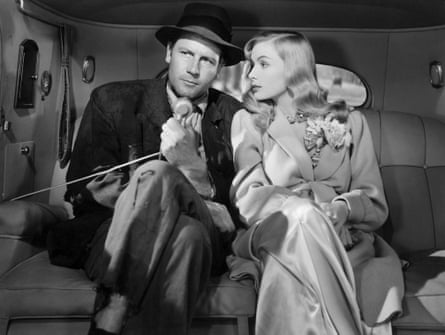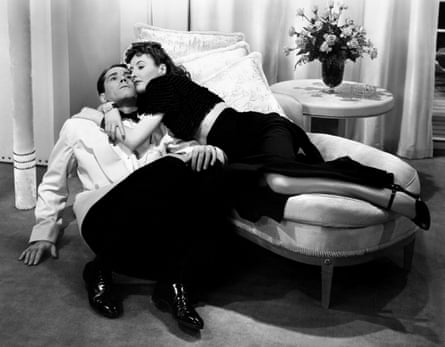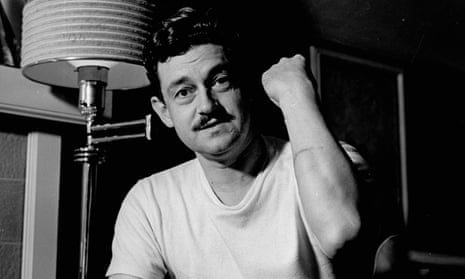“If ever a plot needed a twist, this one does.” That’s one of the most arch, and celebrated lines in Preston Sturges’ Sullivan’s Travels. It’s a great comic story that’s both about storytelling, and about comedy itself – that precious quality of laughter, which “isn’t much, but it’s better than nothing in this cockeyed caravan”. Recently, Tom Sturges, the writer-director’s youngest son, discovered that his own father’s life story was in need of a plot twist. The result is a new book, co-authored by Tom, called Preston Sturges: The Last Years of Hollywood’s First Writer-Director.
Preston is best known now for the dazzling, witty and astute films that he wrote and directed in the early 1940s, including the wonderful Sullivan’s Travels, which satirises Hollywood at the same time as dredging the hardships of the Great Depression, and two ultra-sophisticated screwball comedies, The Lady Eve and The Palm Beach Story. But there was far more to his career, and his relentless inventiveness, than that. After his mother died in 2006, Tom discovered that she had kept all her correspondence with his father, as well as his papers, journals and diaries. The notebooks are fascinating: full of story scenarios, often just a line long, and ideas for inventions wise and wacky, from nicotine tablets to help smokers quit to tiny TV screens attached to spectacles.
It led to Tom collaborating on a book with Nick Smedley, a British author. Smedley has written a biography that concentrates, in revelatory detail, on Preston’s latter years, and Tom has included a glimpse of those notebooks, and descriptive “interludes” that explain a little more about his father’s personal life. These are often breathtakingly raw. “There’s no point in hiding anything. It’s not like he pretended to be somebody else,” he says. There’s jealousy and alcoholism in this story, but also an undimmed ambition, and the same chutzpah that had carried him through the early successes of his career.

Preston made an explosively successful start in pictures. “He was a playwright in 1929. Movies were barely talking, but he jumped into the new technology. ‘I’m going to Hollywood, this is gonna be great,’” says his son. In Hollywood, his first solo credited screenplay was The Power and the Glory in 1933, a melodrama starring Spencer Tracy that tells the tragic life story of a great industrialist in flashback – which is often cited as an inspiration for Citizen Kane. Preston became one of Hollywood’s top screenwriters in the 1930s, but he wanted to direct as well as write. So he took a script he had written called The Biography of a Bum and presented it to his bosses at Paramount.
“He said: ‘Listen, I wrote the script on my own at home. So it’s not yours. But I’ll sell it to you for $1 if you let me direct it.’ And Paramount came back and said: ‘You know what? $1 just doesn’t sound right. How about $10?’” That script became 1940’s The Great McGinty, his directorial debut, about a tramp dragged into a voter fraud racket, casting his ballot 37 times in one day, who ends up being elected the state governor.
As a writer-director, Preston embodied what we think of now as an auteur. But the control he sought over his films was sometimes extraordinary. As Tom recalls, he demanded a clause in his contracts that said he could opt out 30 days after the release of his films. “He insisted on this because he didn’t like the way they marketed one of his films. And he wanted to be able to enforce this if they didn’t live up to his standards.”

Many of Preston’s films deal with the rise and fall of fortune, as well as great extremes of wealth and poverty. By 1948, he was on a winning streak, the third highest-paid person in America, but he had always had run-ins with both the studios and the censors. In 1949 he released a flop, The Beautiful Blonde from Bashful Bend, and it looked as if his film career was all but over. “When he was on his ass, and he’s trying to forge a comeback, he sees TV is the future,” Tom says. After another decade spent fighting to get more films, TV shows and plays made, and only occasionally succeeding, he died in 1959, aged 60. Tom, the youngest of his three sons, was only three years old.
“I spent my whole life trying to figure out who my dad is, you know, with very few clues,” says Tom. “It’s hard to get parental information from Sullivan’s Travels. But I tried to glean from his work what his thoughts were. Part of this whole adventure is my search for my dad. For me, I got a lot of those answers in this book.”
As the book reveals, Preston’s life was anything but conventional, right from his childhood, although it doesn’t take a great leap of imagination to see the influence of his early years on his career. Preston was only educated up to the eighth grade, and he was raised mostly by his mother, whose great friend was the modernist dancer Isadora Duncan. They met in a pharmacy in Paris, just before the turn of the century, when he was a baby and ill with pneumonia.
“Duncan’s right there in the pharmacy and she goes: ‘I know what to do: give him a spoonful of champagne every hour,’” recalls Tom. “And sure enough, within five or six hours, five or six spoonfuls of champagne, he was feeling much, much better.” After that, the two women were inseparable. Painfully, in 1914, his mother left Preston in America to follow Duncan back to Europe. As Tom tells it, Duncan was taking the German girls in her troupe back home and the family were waving her off at the docks, when she called to Preston’s mother and said: “You must come with us.”
Tom continues: “My father said: ‘Don’t tell me you’re thinking of getting on. You have no money. You have no luggage. I’m 16 and there’s a war going on.’ She says: ‘You’ll be fine,’ and runs up the gangplank.” He didn’t see her for two years.

“If you look at most of the films, the central character is a woman: smart, funny, quick on her feet, able to change things around at the last second,” says Tom. “Look at Barbara Stanwyck in The Lady Eve. She’s the locomotive. All the men are jumping on and off, but it’s all about her. The same with The Palm Beach Story … I think all those ladies are his mother.” Years later, in the late 1950s, Preston would make a similar choice, staying behind in Paris when his wife took his children home to the US. The marriage soon ended, and Tom never saw his father again.
“There’s a letter from two weeks before my dad died,” says Tom. “My mom is saying: ‘Come back to us, your sons want a little brother, and you can name them anything you like. You can come here, where your name still means something.’” Why didn’t he get on that plane? “Maybe it was his absolute stubbornness, which was very good early in his career. But when you get older, and you need to compromise, it doesn’t work as well.”
The book, and Tom’s memories of his father, go a long way to explaining what made Preston’s films so unusual. Between their sophisticated use of language, and their acute sense of tearing apart a world just to build it back up again, they always demand repeat viewings. “To be a great storyteller,” says Tom, “you have to be able to see the great story as it unfolds before you. He took reality as he knew it and tried to turn that into the story that he wanted to tell.
“There’s not one joke in a Preston Sturges film,” says Tom. “They were just people speaking their truth. His belief as I understood it was that the truth is funnier than anything else.”
Preston Sturges: The Last Years of the Hollywood’s First Writer-Director by Nick Smedley and Tom Sturges is out now from Intellect Books
